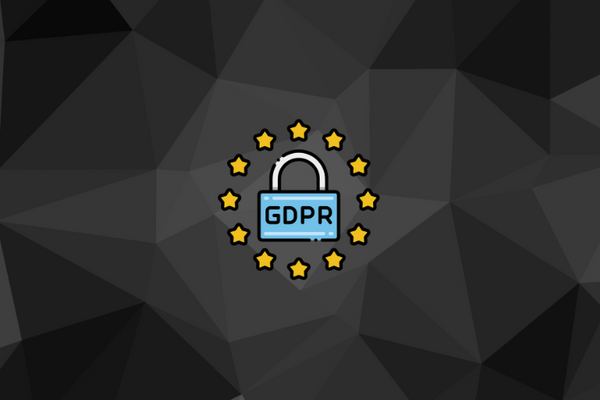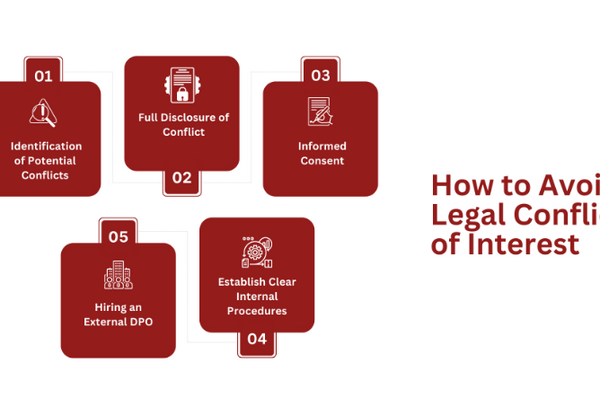
As the digital world evolves, businesses face the ever-growing challenge of safeguarding personal data. The data protection officer (DPO) is at the forefront of these endeavors. This role is essential to ensuring data privacy and adherence to the General Data Protection Regulation (GDPR).
However, within these roles and responsibilities, scenarios can arise that prompt a legal conflict of interest for the data protection officer. This article will explore these potential conflicts, their implications, and the means to prevent or mitigate them.
Let’s dig in to help ensure you never find yourself conflicted and doing something that is not compliant.
Key Takeaways
A legal conflict of interest in GDPR arises when a DPO’s personal or professional circumstances potentially compromise their independent judgment and impartiality.
Businesses can bolster their corporate compliance by avoiding legal conflicts of interest, implementing strategies like proactive identification of potential conflicts, and more. Outsourcing compliance, such as hiring an external DPO, is a highly effective method of avoiding conflicts of interest.
Non-compliance with GDPR principles due to a conflict of interest can lead to substantial fines. The exact amount varies depending on the severity of the violation, but it can range up to 20 million euros or 4% of the business’s global annual turnover, whichever is higher.
What is a Legal Conflict of Interest in GDPR?

The General Data Protection Regulation (GDPR), an embodiment of stringent GDPR principles, was enacted to empower consumers with rights concerning their personal data while setting a high standard for data protection.
Central to the enforcement of these guidelines is the role of the data protection officer (DPO), an individual who oversees a business’s data protection strategy and its implementation to ensure GDPR compliance.
A legal conflict of interest under GDPR arises when a DPO’s professional or personal circumstances may compromise their independent judgment and impartiality. This conflict can occur when a DPO holds multiple roles within a business, some of which may involve making decisions on the processing of personal data.
For example, if a DPO also serves as an IT manager responsible for data processing decisions, it could be challenging to uphold the independence required of a DPO role, leading to a conflict of interest. This conflict can have significant implications for a business.
Not only can it undermine the DPO’s ability to perform their responsibilities effectively, but it can also jeopardize the business’s data protection compliance. Non-compliance can lead to severe penalties under the GDPR, including fines and reputational damage.
Legal Conflict of Interest for a Data Protection Officer: A Balancing Act
You hire a Data Protection Officer to navigate the complex landscape of data privacy regulations. Your internal, outsourced, or external employee should play a crucial role in ensuring compliance with privacy requirements, safeguarding personal data, and fostering a culture of privacy within an organization. However, the very nature of their role can sometimes create potential conflicts of interest.
What is a Conflict of Interest?
A conflict of interest arises when a DPO’s personal or professional interests could potentially compromise their independence and impartial judgment in carrying out their data protection duties. This can occur when a DPO holds multiple roles within an organization, has close ties with individuals involved in data processing, or has external engagements that might create conflicting loyalties.
Why are Conflicts of Interest a Concern?
DPOs must be able to act objectively and independently to ensure that data protection is prioritized. Conflicts of interest can undermine this independence, potentially leading to:
- Compromised Compliance: A DPO with conflicting interests might be less likely to challenge decisions or practices that could violate data protection laws.
- Reduced Trust: If stakeholders perceive that a DPO is not impartial, it can erode trust in the organization’s commitment to data privacy.
- Regulatory Scrutiny: Data protection authorities may investigate organizations where DPOs have apparent conflicts of interest, potentially leading to fines or other sanctions.
Common Scenarios Leading to Conflicts of Interest
- Dual Roles: When a DPO also holds a position that involves making decisions about data processing (e.g., IT manager, marketing director), it can be difficult to maintain the necessary impartiality.
- Personal Relationships: Close ties with individuals who have influence over data processing activities can create bias and compromise objective decision-making.
- Financial Interests: If a DPO has financial interests in companies or projects related to data processing, it could affect their ability to provide unbiased advice.
- External Engagements: Consulting for other organizations, particularly competitors or those in the same industry, can lead to conflicts of interest.
How to Identify and Manage Conflicts of Interest
Organizations should take proactive steps to identify and manage potential conflicts of interest for their DPOs:
- Conduct a Thorough Assessment: Evaluate the DPO’s roles, responsibilities, relationships, and external engagements to identify any potential conflicts.
- Establish Clear Policies: Implement clear guidelines and policies on conflicts of interest, outlining prohibited activities and disclosure requirements.
- Require Disclosure: Mandate that DPOs disclose any potential conflicts of interest, both real and perceived.
- Implement Safeguards: If a conflict is identified, implement safeguards to mitigate the risk, such as:
- Segregation of Duties: Separate the DPO’s data protection responsibilities from other roles that might create conflicts.
- Independent Oversight: Establish a mechanism for independent oversight of the DPO’s work, such as a privacy committee or external audit.
- External DPO: Consider hiring an external DPO to provide independent expertise and avoid internal conflicts.
- Provide Training: Train DPOs and other relevant personnel on conflict of interest policies and procedures.
- Document Everything: Maintain thorough records of conflict of interest assessments, disclosures, and mitigation measures.
Balancing Act
While it’s essential to avoid conflicts of interest, it’s also important to recognize that DPOs often have diverse skill sets and experience that can benefit the organization in other ways. The key is to strike a balance between allowing DPOs to contribute their expertise and ensuring their independence in data protection matters. Managing conflicts of interest for DPOs is a critical aspect of data privacy compliance. By proactively identifying potential conflicts, implementing safeguards, and fostering a culture of transparency, organizations can ensure that their DPOs can effectively protect personal data and uphold the principles of data privacy.
How to Identify Legal Conflict of Interest for the Data Protection Officer
Detecting possible conflicts of interest involving the DPO is vital to uphold strong data protection corporate compliance.
Various factors, each with unique attributes, may instigate a potential conflict. In this section, we’ll explore the key areas that can give rise to a legal conflict of interest for a DPO:
Additional Roles within the Business
If a DPO takes on various roles in a company, the likelihood of a conflict of interest escalates. Should these supplementary roles involve data processing decisions, they could compromise the DPO’s ability to execute their duties independently.
For instance, if a DPO also serves as an IT manager, they might be tempted to prioritize operational efficiency over data protection, leading to a potential conflict.
Businesses must scrutinize the DPO’s additional roles and assess how they align with their data protection duties.
Relationships with Other Organizational Members
Personal relationships between the DPO and other members of the business can lead to a conflict of interest.
If a DPO has close personal ties with individuals who have decision-making power over data processing, their ability to act impartially and independently may be compromised.
Businesses need to be aware of these relationships and establish guidelines to prevent such conflicts. Transparency and open communication are key in managing potential conflicts arising from personal relationships.
Financial Interests
Financial interests can also pose a potential conflict of interest for the DPO. For instance, if the DPO has investments in a third-party data processing business that the business uses, it may be difficult for them to maintain their impartiality.
To mitigate this risk, businesses should have a comprehensive understanding of the DPO’s financial interests. Regular disclosure of these interests can help identify and manage potential conflicts of interest.
Outside Engagements
A DPO’s engagements outside the business can also lead to conflicts of interest. If a DPO offers consultancy services to other businesses, especially those in the same industry, conflicts may arise.
These engagements may divide the DPO’s attention and impact their ability to focus solely on the data protection obligations of the business. Businesses must monitor such engagements and assess their potential impact on the DPO’s role.
Competing Duties
Sometimes, a DPO’s responsibilities may inherently conflict with their data protection duties. If the DPO is tasked with data monetization, for example, they might be caught between maximizing data utilization and ensuring data privacy.
Businesses should be cautious about the range of duties assigned to the DPO and ensure that they don’t conflict with their core role of data protection. Maintaining a clear segregation of duties can help avoid this kind of conflict.
How to Avoid Legal Conflict of Interest

In an ever-evolving digital landscape, businesses must prioritize safeguarding personal data, and avoiding potential conflicts of interest for their DPO is a crucial step in this process. Below are effective strategies that can help mitigate the risk of legal conflicts of interest:
Proactive Identification of Potential Conflicts
Prevention is always better than cure, and this holds actual when managing conflicts of interest.
To implement successful compliance solutions, businesses should proactively identify potential conflicts by thoroughly reviewing the DPO’s roles and responsibilities, financial interests, and external engagements. Regular audits and self-assessment tools can aid in this proactive identification.
Full Disclosure of Conflict
If a potential conflict of interest is identified, it should be fully disclosed to the necessary parties within the business.
Transparency fosters trust, and it enables the business to take prompt action to address the issue. The DPO should be encouraged to disclose any circumstance that could be perceived as a conflict.
Informed Consent
In some cases, conflicts of interest may be inevitable. In these situations, obtaining informed consent from stakeholders ensures that they are aware of the conflict and its potential implications. However, this should be considered as a last resort, as the best strategy is always to avoid conflicts of interest when possible.
Establish Clear Internal Procedures
Having clear internal procedures in place can help manage and prevent conflicts of interest. These procedures should outline the DPO’s responsibilities, provide guidelines for conflict disclosure, and offer directions on the steps to take when a dispute arises.
Hiring an External DPO
One of the most effective compliance services to avoid potential conflicts of interest is to outsource data protection officer work.
Hiring an external DPO, like the services offered by Captain Compliance, ensures that the DPO’s only duty is to protect data. An external DPO brings a laser-focused approach to data protection without the risk of conflicting interests or divided attention.
Fines for DPO Conflict of Interest

The consequences of a DPO conflict of interest can be severe, extending beyond just reputational damage. Under the GDPR, businesses can face significant monetary penalties for non-compliance, including situations involving a conflict of interest with their DPO.
GDPR mandates two tiers of administrative fines based on the severity of the violation.
For lesser infringements, which include situations where a business fails to designate a DPO in the required circumstances, the fine can be up to 10 million euros or 2% of the business’s global annual turnover of the previous fiscal year, whichever is higher.
More severe violations, such as those involving the core principles of processing personal data, can result in a fine of up to 20 million euros or 4% of the business’s global annual turnover, again, whichever is higher.
If a conflict of interest causes the DPO to violate data processing principles, the business could be subjected to this higher tier of fines.
It’s important to note that these figures represent the maximum fines, and the exact amount would be determined on a case-by-case basis, considering factors like the nature, gravity, and duration of the infringement, as well as the business’s history of compliance.
Despite this, the potential for such hefty penalties underscores the vital importance of preventing and promptly addressing any conflicts of interest involving the DPO.
Closing
Managing data protection and achieving comprehensive GDPR compliance can be challenging, particularly when dealing with potential conflicts of interest involving the DPO.
With this newfound understanding of the potential pitfalls, your next logical step is to set preventative strategies in place.
Captain Compliance can significantly alleviate this burden. As a provider of external data protection officer services (DPOaaS), we offer an impartial solution that eliminates the risk of internal conflicts of interest. Our superheroes can guide you through the intricacies of the GDPR and establish data compliance solutions tailored to your needs.
FAQs
What is a Data Protection Officer (DPO)?
A data protection officer (DPO) is an individual appointed by a business to ensure that it is in compliance with GDPR rules. The DPO oversees the data protection strategy and implementation to ensure compliance with GDPR requirements.
To dive deeper into the role of a DPO, check out here.
How can I avoid a conflict of interest with a DPO?
There are several methods to avoid a DPO conflict of interest, such as proactive identification and disclosure of potential conflicts, obtaining informed consent, and establishing clear internal procedures. A highly effective strategy is to outsource the DPO role, eliminating internal conflicts.
Discover the benefits of outsourcing the DPO role.
Why is it beneficial to outsource Data Protection Officer work?
Outsourcing the data protection officer role allows businesses to focus on their core operations while ensuring full compliance with data protection regulations. An outsourced DPO brings expertise, eliminates the risk of internal conflicts of interest, and can often provide a more cost-effective solution.
Want to understand more about how outsourcing the DPO role can benefit your business? Discover the details here.
How can Captain Compliance assist with avoiding DPO conflicts of interest?
Captain Compliance offers DPOaaS, effectively removing any potential internal conflicts of interest by providing a dedicated, external DPO. This ensures that the sole focus is on protecting data and ensuring GDPR compliance.
Interested in avoiding conflicts and being compliant? If so book a demo below to learn more about our software solutions for automating compliance requirements.